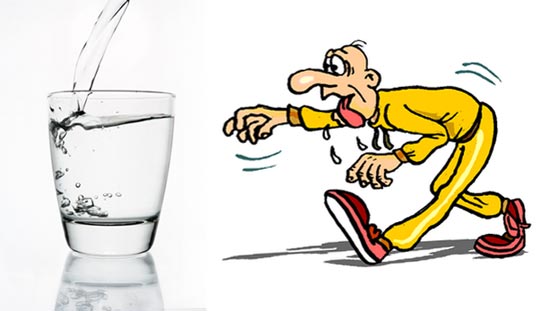
Dehydration takes place when your body loses more fluid than you drink. The most common cause of water loss from the body.
DEHYDRATION
This is the condition occurs due to the loss of body fluids, especially water, exceeds the amount that is taken in. With dehydration, more water is moving out of individual cells and then out of the body than the amount of water that is taken in through drinking. In medical terms, dehydration means a person who has lost an enough fluid from the body that begins to lose its ability to function normally and then begins to produce symptoms related to the fluid loss.
Signs and symptoms:
· Dry mouth and tongue
· No tears when crying
· No wet diapers for three hours
· Sunken eyes, cheeks
· Sunken soft spot on top of skull
· Listlessness or irritability
· Extreme thirst
· Less frequent urination
· Dark-colored urine
· Fatigue
· Dizziness
· Confusion
Causes:
Complication:
· Heat injury: If you don't drink enough fluids when you're exercising vigorously and perspiring heavily, you may end up with a heat injury, ranging in severity from mild heat cramps to heat exhaustion or potentially life-threatening heatstroke.
· Urinary and kidney problems: Prolonged or repeated bouts of dehydration can cause urinary tract infections, kidney stones and even kidney failure.
· Seizures: Electrolytes such as potassium and sodium help to carry electrical signals from cell to cell. If electrolytes do not maintain balance, the normal electrical messages may become mixed up, that can lead to involuntary muscle contractions and sometimes to a loss of consciousness.
· Low blood volume shock (hypovolemic shock): This is one of the most serious, and sometimes life-threatening, complications of dehydration. It occurs when low blood volume causes a drop in blood pressure and a drop in the amount of oxygen in your body.
Diagnosis:
· Blood tests. Blood samples may be used to check for a number of factors, such as the levels of your electrolytes — especially sodium and potassium — and how well your kidneys are working.
· Urinalysis. Tests done on your urine can help show whether you're dehydrated and to what degree. They also can check for signs of a bladder infection.
Treatment:
Treatment in the Emergency Department centers first on restoring fluid (blood) volume and electrolytes, and treating any life-threatening symptoms while also trying to determine the underlying cause(s) of the dehydration.
If the patient body temperature is greater than 40 C (104 F), physician will cool the entire body. They may promote cooling by evaporation with mists and fans or cooling blankets and baths.
Dehydration,mild, moderate or severe, body weight, lost of fluids. water content